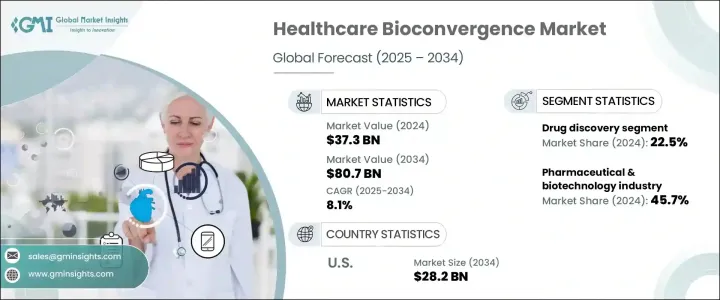
세계의 헬스케어 바이오컨버전스 시장은 2024년 373억 달러에 이르렀으며, 2025-2034년 연평균 복합 성장률(CAGR) 8.1%로 성장할 것으로 예상됩니다.
급속히 발전하는 이 시장은 컴퓨터 과학, 인공지능(AI), 엔지니어링, 바이오테크놀러지 등 최첨단 기술을 통합하여 헬스케어의 미래를 재정의하고 있습니다. 생명과학과 테크놀로지의 격차를 메움으로써, 바이오컨버전스는 의료 연구, 진단, 치료의 개별화에 있어서 혁신을 가속시키고 있습니다.

만성질환의 만연, 인구의 고령화, 치료비의 상승으로 세계의 헬스케어 시스템이 큰 압박에 직면하는 가운데, 고도의 데이터 주도형 솔루션에 대한 수요가 급증하고 있습니다. 개별화 의료, 재생요법, AI 주도형 진단의 추진이 이 분야에 대한 투자를 더욱 촉진하고 있어 바이오컨버전스는 현대 헬스케어의 중요한 기둥이 되고 있습니다. 게다가 대형 제약사 및 바이오 테크놀로지 기업은 획기적인 솔루션을 개발하기 위해 기술 주도의 신흥 기업과 협력하고 있어 점점 경쟁 정세가 격화되고 있습니다. 바이오일렉트로닉스, 옵토제네틱스, 나노로보틱스의 채용 확대로 헬스케어의 변혁이 진행되어 환자의 전귀가 개선되고 의료 개입이 최적화됩니다.
| 시장 범위 | |
|---|---|
| 시작 연도 | 2024년 |
| 예측 연도 | 2025-2034년 |
| 시작 금액 | 373억 달러 |
| 예측 금액 | 807억 달러 |
| CAGR | 8.1% |
시장은 창약, 약물전달용 나노로보틱스, 재생 의료, 정밀의료 등 다양한 용도로 구분됩니다. 2024년에는 신약개발이 22.5%로 가장 큰 비중을 차지했으며, 전 세계 헬스케어 비용 증가, 만성질환 만연 증가, 주요 약제 특허 소진 등이 그 요인입니다. 제약회사는 신약개발을 강화하고 연구기간을 단축하며 비용을 절감하기 위해 AI를 탑재한 툴을 빠르게 통합하고 있습니다. 약물 전달을 위한 나노로보틱스는 표적 약물 전달을 개선하고 부작용을 최소화하는 능력이 있어 예측 기간 동안 가장 빠른 성장이 예상됩니다. 바이오 일렉트로닉스나 옵토제네틱스라고 하는 다른 혁신적 애플리케이션도 기세를 올리고 있어 신경 치료, 시력 회복, 만성 질환 관리에 있어서의 새로운 가능성을 끌어내고 있습니다.
제약 기업 및 생명 공학 기업은 2024년 헬스케어 바이오컨버전스 시장의 45.7%를 차지했으며, 주요 최종 사용자로서의 지위를 굳히고 있습니다. 이러한 업계는 연구 이니셔티브를 추진하여 자금을 확보하고 헬스케어의 의사결정에 영향을 주는 데 중요한 역할을 하고 있습니다. 제약 대기업은 바이오컨버전스를 활용해 업무 효율을 개선하고 임상시험을 합리화하며 차세대 치료법을 개발하고 있습니다. 또한 많은 기업들이 건강 데이터를 연구 확장에 활용하거나 되팔아 수익화하고 있습니다. 제약 기업이나 바이오 테크놀로지 기업과 함께, 의약품 개발 업무 수탁 기관(CRO)이나 헬스 케어 프로바이더도 시장 확대에 공헌하고 있으며, 병원이나 연구 기관은 AI를 활용한 바이오컨버전스 플랫폼을 채용해 정밀 의료의 진보를 추진하고 있습니다.
미국의 헬스케어 바이오컨버전스 시장은 2024년에 142억 달러를 창출했으며, AI를 활용한 진단 기술에 대한 지속적인 투자로 2034년에는 282억 달러에 이를 것으로 예측되고 있습니다. 대형병원, 연구센터, 바이오테크놀로지 기업들은 유전자, 환경, 라이프스타일의 데이터를 분석하고 고도로 맞춤화된 치료 전략을 마련하기 위해 AI 구동형 플랫폼의 채택을 늘리고 있습니다. 디지털 헬스 솔루션, 예측 분석, AI 지원 임상 의사결정의 통합이 진행되는 가운데, 미국은 헬스케어 바이오컨버전스 혁신의 최전선에 계속 있어 장기적인 시장 성장을 확실하게 하고 있습니다.
The Global Healthcare Bioconvergence Market reached USD 37.3 billion in 2024 and is expected to grow at a CAGR of 8.1% between 2025 and 2034. This rapidly evolving market is redefining the future of healthcare by integrating cutting-edge technologies such as computer science, artificial intelligence (AI), engineering, and biotechnology. By bridging the gap between life sciences and technology, bioconvergence is accelerating innovations in medical research, diagnostics, and treatment personalization.

As healthcare systems worldwide face increasing pressure due to rising chronic disease prevalence, aging populations, and escalating treatment costs, the demand for advanced, data-driven solutions is surging. The push for personalized medicine, regenerative therapies, and AI-driven diagnostics is further driving investments in this sector, making bioconvergence a key pillar of modern healthcare. Additionally, major pharmaceutical and biotechnology firms are collaborating with tech-driven startups to develop groundbreaking solutions, creating an increasingly competitive landscape. The growing adoption of bioelectronics, optogenetics, and nanorobotics is set to transform healthcare, enhancing patient outcomes and optimizing medical interventions.
| Market Scope | |
|---|---|
| Start Year | 2024 |
| Forecast Year | 2025-2034 |
| Start Value | $37.3 Billion |
| Forecast Value | $80.7 Billion |
| CAGR | 8.1% |
The market is segmented into various applications, including drug discovery, nanorobotics for drug delivery, regenerative medicine, and precision medicine, among others. In 2024, drug discovery held the largest share at 22.5%, fueled by increasing global healthcare costs, the rising prevalence of chronic illnesses, and the expiration of key drug patents. Pharmaceutical companies are rapidly integrating AI-powered tools to enhance drug discovery, reduce research timelines, and cut costs. Nanorobotics for drug delivery is anticipated to experience the fastest growth throughout the forecast period, given its ability to improve targeted drug delivery and minimize adverse effects. Other innovative applications, such as bioelectronics and optogenetics, are also gaining momentum, unlocking new possibilities in neurological treatments, vision restoration, and chronic disease management.
Pharmaceutical and biotechnology companies accounted for 45.7% of the healthcare bioconvergence market in 2024, solidifying their position as the leading end-users. These industries play a crucial role in advancing research initiatives, securing funding, and influencing healthcare decision-making. Pharma giants are leveraging bioconvergence to improve operational efficiencies, streamline clinical trials, and develop next-generation therapies. Many companies are also monetizing health data by utilizing it for research expansion or reselling it to generate additional revenue. Alongside pharmaceutical and biotech firms, contract research organizations (CROs) and healthcare providers are also contributing to market expansion, with hospitals and research institutions adopting AI-powered bioconvergent platforms to drive precision medicine advancements.
The U.S. Healthcare Bioconvergence Market generated USD 14.2 billion in 2024 and is projected to reach USD 28.2 billion by 2034, driven by continuous investments in AI-powered diagnostic technologies. Leading hospitals, research centers, and biotech firms are increasingly adopting AI-driven platforms to analyze genetic, environmental, and lifestyle data, creating highly customized treatment strategies. With the rising integration of digital health solutions, predictive analytics, and AI-assisted clinical decision-making, the U.S. remains at the forefront of healthcare bioconvergence innovation, ensuring long-term market growth.